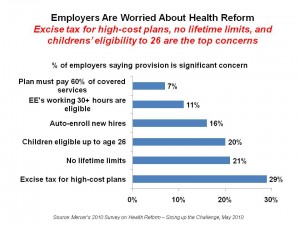 Mercer, the benefits consulting firm, polled 800 employers in May 2010 to get a snapshot on their current concerns about implementing health reform – that is, the Patient Protection and Affordable Care Act (PPACA).
The chart on the right lays out the main PPACA pain points for employers. Foremost among these, for nearly 1 in 3 employers, is the excise tax on high-cost plans. This is a significant issue for employers whose health benefits are a strategic component of compensation to attract and retain highly skilled/high value workers.
Another issue that relates to managing costs is PPACA’s mandate for auto-enrolling new hires to the company. Employers may use the lowest-cost health plan as a default for these new workers (identified as a useful strategy by 43% of employers).
The PPACA rules will be particularly difficult for companies in services industries, especially retail. Mercer’s survey found that the rule mandating employers to offer affordable health coverage to all employees who work at least 30 hours per week is a major concern for 1 in 4 retailers, versus 11% of employers overall. To manage this challenge, service companies could reduce the number of employees who work over 30 hours a week, and/or offer leaner plans.
Costs are clearly on the mind of employers when thinking about PPACA. 1 in 4 employers expect the bill to add over 3% to health care costs; 30% of employers can’t estimate what PPACA’s cost impact will be.
Health Populi’s Hot Points: U.S. employers face major uncertainties and wildcards as they look beyond 2012 to provide health insurance. Among the uncertainties, most top-of-mind is when will meaningful economic recovery kick in? The financial crisis in Europe (now Greece, potentially to be followed by Spain, Portugal and other falling financial Euro-dominoes), the Louisiana oil spill and vagaries around oil prices, and political uncertainties come the mid-term November 2010 election boggle the minds of business execs, from CEOs to human resource heads.
On the U.S. political front, there is the wild card of Tea Party activists and others who may be interested in separating health insurance from its employer-base. That would require a host of policy changes, including major rewrites of tax policy. The longer the economy languishes and the so-called ‘jobless recovery’ persists, the more likely such a scenario would gain traction among conservatives and some Independents. This is a must-stay-tuned issue.]]>
Mercer, the benefits consulting firm, polled 800 employers in May 2010 to get a snapshot on their current concerns about implementing health reform – that is, the Patient Protection and Affordable Care Act (PPACA).
The chart on the right lays out the main PPACA pain points for employers. Foremost among these, for nearly 1 in 3 employers, is the excise tax on high-cost plans. This is a significant issue for employers whose health benefits are a strategic component of compensation to attract and retain highly skilled/high value workers.
Another issue that relates to managing costs is PPACA’s mandate for auto-enrolling new hires to the company. Employers may use the lowest-cost health plan as a default for these new workers (identified as a useful strategy by 43% of employers).
The PPACA rules will be particularly difficult for companies in services industries, especially retail. Mercer’s survey found that the rule mandating employers to offer affordable health coverage to all employees who work at least 30 hours per week is a major concern for 1 in 4 retailers, versus 11% of employers overall. To manage this challenge, service companies could reduce the number of employees who work over 30 hours a week, and/or offer leaner plans.
Costs are clearly on the mind of employers when thinking about PPACA. 1 in 4 employers expect the bill to add over 3% to health care costs; 30% of employers can’t estimate what PPACA’s cost impact will be.
Health Populi’s Hot Points: U.S. employers face major uncertainties and wildcards as they look beyond 2012 to provide health insurance. Among the uncertainties, most top-of-mind is when will meaningful economic recovery kick in? The financial crisis in Europe (now Greece, potentially to be followed by Spain, Portugal and other falling financial Euro-dominoes), the Louisiana oil spill and vagaries around oil prices, and political uncertainties come the mid-term November 2010 election boggle the minds of business execs, from CEOs to human resource heads.
On the U.S. political front, there is the wild card of Tea Party activists and others who may be interested in separating health insurance from its employer-base. That would require a host of policy changes, including major rewrites of tax policy. The longer the economy languishes and the so-called ‘jobless recovery’ persists, the more likely such a scenario would gain traction among conservatives and some Independents. This is a must-stay-tuned issue.]]>
Employers are worried about health reform
By Jane Sarasohn-Kahn on 24 May 2010 in Employers, Health Economics, Health reform, Health regulation, Managed care




 I'm in amazing company here with other #digitalhealth innovators, thinkers and doers. Thank you to Cristian Cortez Fernandez and Zallud for this recognition; I'm grateful.
I'm in amazing company here with other #digitalhealth innovators, thinkers and doers. Thank you to Cristian Cortez Fernandez and Zallud for this recognition; I'm grateful. Jane was named as a member of the AHIP 2024 Advisory Board, joining some valued colleagues to prepare for the challenges and opportunities facing health plans, systems, and other industry stakeholders.
Jane was named as a member of the AHIP 2024 Advisory Board, joining some valued colleagues to prepare for the challenges and opportunities facing health plans, systems, and other industry stakeholders.  Join Jane at AHIP's annual meeting in Las Vegas: I'll be speaking, moderating a panel, and providing thought leadership on health consumers and bolstering equity, empowerment, and self-care.
Join Jane at AHIP's annual meeting in Las Vegas: I'll be speaking, moderating a panel, and providing thought leadership on health consumers and bolstering equity, empowerment, and self-care.